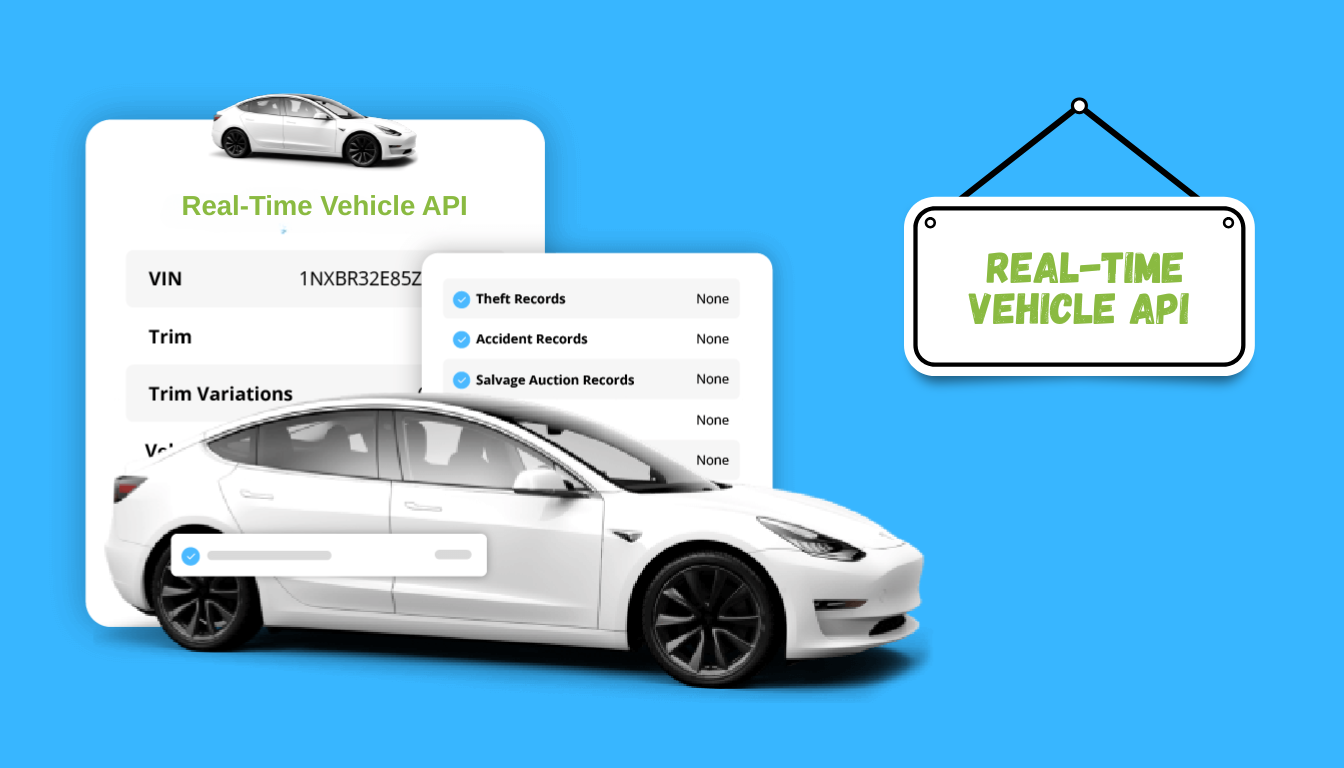How Real-Time Vehicle APIs Are Making Life Easier for the Automotive World

Ever wonder how applications can rapidly bring up complete car information simply by entering a VIN? People in today's fast-paced digital world want quick, reliable data, especially when it comes to cars. The smooth experiences in many industries are made possible by real-time vehicle APIs, which verify ownership, accident history, and resale value.
But just hooking up to a vehicle API isn’t enough. To get the most out of these technologies, firms must understand how they offer reliable data, reduce fraud, and make operations run smoother. Let’s dive into what real-time vehicle APIs do and why they’re so important.
What is a Real-Time Vehicle API?
Think of a real-time car API as an incredibly fast method to access a variety of vehicle information, including make, model, year, engine specifications, ownership history, mileage, and even recall notifications. These APIs take data from a variety of reputable sources, including government databases, auctions, and dealerships, eliminating the need to develop huge systems yourself.
Vehicle APIs in Key Industries
Real-time vehicle APIs provide fast and accurate data that supports more intelligent decision-making in a variety of industries. These APIs improve efficiency, lower risks, and increase transparency for everyone from fleet managers to insurers and app developers.
- Developers: Build Smarter AppsAPIs may be used to decode VINs, verify mileage, and see maintenance history. This supports quicker and more smooth user experiences by supporting applications for monitoring services, used car sales, and automobile value calculations.
- Insurers: Get Better Risk InsightsLeverage vehicle data to speed up claims and underwriting by verifying histories, detecting fraud like odometer manipulation, and confirming ownership. This leads to more accurate risk assessments and fewer false claims.
- Fleet Managers: Keep Things Running SmoothlyUse real-time data to track mileage, get recall warnings, and plan maintenance. This helps to decrease downtime, maintain compliance, and efficiently manage investments.
- Dealers and Marketplaces: Build Buyer TrustVerify mileage, confirm ownership, and provide salvage or accident histories. API transparency promotes fair pricing and increases consumer trust.
Best Practices for Vehicle APIs
Using real-time vehicle APIs the right way ensures accuracy, speed, and security. Follow these tips to get the most out of your integration:
- Choose a Reliable ProviderPick an API that delivers real-time updates, detailed vehicle info, and offers strong developer support. Accuracy builds user trust.
- Make It User-FriendlyKeep VIN input simple and data displays clear. A smooth, easy experience helps users get what they need quickly.
- Optimize for SpeedUse caching and asynchronous requests to avoid delays. Fast loading keeps users engaged and satisfied.
- Secure Sensitive DataProtect information with HTTPS, token-based authentication, and continuous monitoring to prevent breaches.
- Plan for GrowthSelect APIs that scale smoothly as your app or business grows, handling more requests without slowing down.
Key Takeaways
- Real-time vehicle APIs deliver fast, accurate data that powers apps, insurance, and fleet operations.
- They help reduce fraud and improve efficiency.
- User-friendly design and quick response times make for a better experience.
- Security and scalability are essential for long-term success.
Final Thoughts
Real-time vehicle APIs are changing the way businesses handle vehicle data. They take the guesswork out of the process, cut down on manual tasks, and help teams make faster, better decisions. But it’s not just about plugging into any API—you need reliable data, smooth integration, and room to grow.
As vehicle tech keeps moving forward, the companies that use these tools the right way will stay ahead of the curve. They free up time, reduce stress, and let teams focus on what really matters, helping customers and building better experiences. At the end of the day, it’s about working smarter, not harder and real-time vehicle APIs make that possible.
FAQs
1. What is a real-time vehicle API?It’s an API that delivers instant, detailed vehicle info from trusted sources, like VIN data, ownership records, specs, and recalls.
2. Who benefits most from using these APIs?Developers building automotive apps, insurance companies managing risk, fleet operators tracking vehicles, and used car dealers verifying inventory.
3. Is it hard to integrate a real-time vehicle API?Most providers offer easy-to-follow documentation and sample code, so integration is pretty straightforward.
4. How do vehicle APIs help prevent fraud?They detect odometer tampering, cloned VINs, stolen vehicles, and hidden accident histories, protecting businesses and buyers alike.
5. Can vehicle APIs handle large-scale use?Yes, many support high volumes with scalable pricing and infrastructure built for growth.